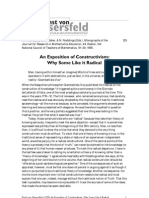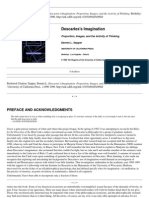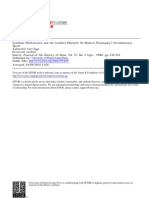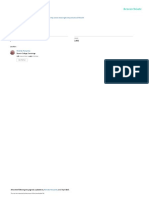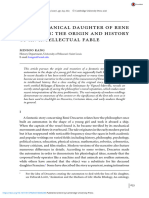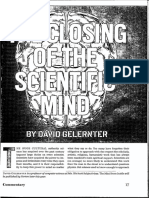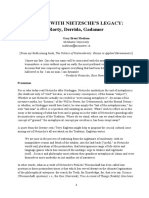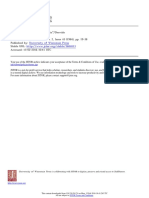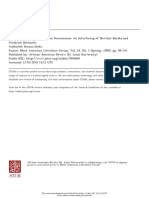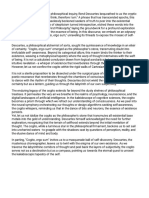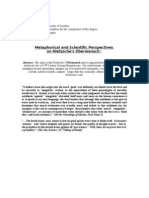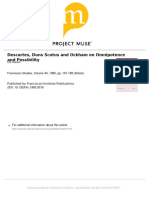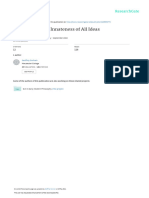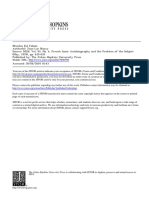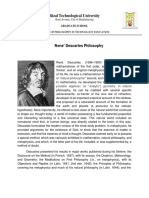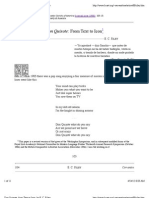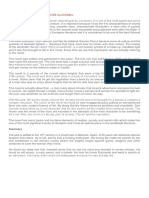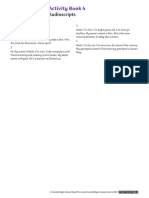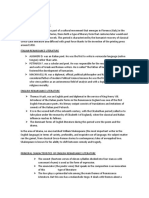Professional Documents
Culture Documents
Descartes Evil Genius Don Q
Descartes Evil Genius Don Q
Uploaded by
Saeed jafariOriginal Title
Copyright
Available Formats
Share this document
Did you find this document useful?
Is this content inappropriate?
Report this DocumentCopyright:
Available Formats
Descartes Evil Genius Don Q
Descartes Evil Genius Don Q
Uploaded by
Saeed jafariCopyright:
Available Formats
Descartes's Demon and the Madness of Don Quixote
Author(s): Steven Nadler
Source: Journal of the History of Ideas, Vol. 58, No. 1 (Jan., 1997), pp. 41-55
Published by: University of Pennsylvania Press
Stable URL: http://www.jstor.org/stable/3653987 .
Accessed: 22/06/2014 22:29
Your use of the JSTOR archive indicates your acceptance of the Terms & Conditions of Use, available at .
http://www.jstor.org/page/info/about/policies/terms.jsp
.
JSTOR is a not-for-profit service that helps scholars, researchers, and students discover, use, and build upon a wide range of
content in a trusted digital archive. We use information technology and tools to increase productivity and facilitate new forms
of scholarship. For more information about JSTOR, please contact support@jstor.org.
University of Pennsylvania Press is collaborating with JSTOR to digitize, preserve and extend access to
Journal of the History of Ideas.
http://www.jstor.org
This content downloaded from 91.229.229.96 on Sun, 22 Jun 2014 22:29:03 PM
All use subject to JSTOR Terms and Conditions
Descartes's Demon and the
Madness of Don Quixote
StevenNadler
Descartes's "maliciousdemon"(genius malignus,le mauvaisgenie)-the
evil deceiver of the Meditationson First Philosophywhose hypotheticalexist-
ence threatensto undermineradicallyDescartes's confidence in his cognitive
faculties-is an artfulphilosophicaland literarydevice. There is considerable
debate over the significance of this powerful and malevolent being within
Descartes's argumentativestrategy.Some insist that its role is a substantive
one, with Descartes introducingthe deceiver in orderto deepen yet furtherthe
skeptical doubts of the First Meditation,doubts from which he hopes, by the
grace of a benevolentGod, eventuallyto rescue himself.' Othersclaim that its
role is merely a rhetoricalone, with the demon meant simply to reinforceal-
ready philosophicallywell-establishedskepticaldoubtsthat, in the face of ev-
eryday habit, are difficult to sustain.2Eitherway, there is no underestimating
the force of the hypothesisas an epistemologicaltool for subvertingourfaithin
our reasoningand sensorypowers.
I am gratefulto Red Watson, Larry Shapiro, Zev Trachtenberg,and Timothy Reiss for
their comments and suggestions. A French version of this paper was read to a conference
commemoratingthe 400th anniversaryof Descartes's birthat the Universit6de Laval,Quebec
(September 1996). I wish to thank all of the participants in the discussion there for their
helpful remarks. References are to the Oeuvres de Descartes, ed. Charles Adam and Paul
Tannery(12 vols.; Paris, 1974-83), by "AT,"vol. and p. no., translationsfrom The Philosophi-
cal Writingsof Descartes, tr. John Cottingham,Robert Stoothoff, Dugald Murdoch,and An-
thony Kenny (3 vols.; Cambridge,1984), by "CSM,"vol. andp. no.; andto Miguel de Cervantes
Saavedra,Obras Completas (18 vols.; Madrid, 1928-41), Don Quixote appearingin volumes
XV-XVIII, translationsby J. M. Cohen (Harmondsworth,1950).
See BernardWilliams, Descartes: TheProject of Pure Enquiry(Harmondsworth,1978),
56; and Harry Frankfurt, Demons, Dreamers, and Madmen: The Defense of Reason in
Descartes's Meditations (Indianapolis, 1970), 87.
2 See Henri Gouhier,Essais sur Descartes (Paris, 1949), 154; and RobertWachbrit,"Car-
tesian Skepticism from Bare Possibility,"JHI, 57 (1996), 109-29.
41
Copyright1997 by Journalof the Historyof Ideas, Inc.
This content downloaded from 91.229.229.96 on Sun, 22 Jun 2014 22:29:03 PM
All use subject to JSTOR Terms and Conditions
42 StevenNadler
It is usefulto placethe"evilgenius"in thecontextof seventeenth-century
intellectualculture3 notjust forourunderstanding of whatmayhavebeenthe
historicaloriginsof this most extremeand "metaphysical"4 of all skeptical
doubtsbutalsoforbroadening ourappreciation of its significancebeyondepis-
temologyalone.Whenwe graspthevariouspractical(moral,legal,andsocial)
problemsandtheliteraryandartisticpossibilitiesraisedby thedemonhypoth-
esis, we cansee why suchanimprobably hyper-skeptical thesisis nonetheless
of
deserving general interest.
To takejust one example, RichardPopkin,in his
seminalworkon the historyof skepticismin earlymodemthought,describes
the knottyproblemsthataregeneratedin the legalcontextof a trialwhenthe
issue of the demonicis raised(as in the case of someoneon trialfor witch-
craft).5
Intheserviceof thiscontextualizing projectI compareDescartes'smedita-
tor (withhis self-assumedskepticalpose) with a near-contemporary literary
character of particularfameandimportance. Whatis especiallystriking-and
instructive-inthis comparisonarethe parallelsandresonancesbetweenthe
kindof general,systematic,philosophically-generated hyperbolicdoubtthat
Descartesintroducesby way of his deceptorpotentissimuset malignusand the
initiallymoreparticular (butperhapsequallysystematic)distrustof the facul-
ties thatis suggestedby Don Quixote'sown"rationalization" of his illusions.6
In factpreciselythe samephilosophicalproblemis raisedbothin thefirstma-
jorworkof modemphilosophyandin thefirstmodemnovel:in thefaceof the
possibilityof ongoingdeceptionby somepowerfulandmaliciousbeing,how
canwe possiblytrustoursensoryandrationalfacultiesto provideus withtrue
andreliableknowledge?Descartes'sphilosophicalworkcan evenprovideus
witha key to understanding partof the natureof Don Quixote'smadness,to
systematizing it in its epistemological
dimensions.Reciprocally,it maybe that
Cervantes's herogives us a concretepictureof whatit wouldbe liketo tryto
live in the radicallydeceptiveworldof the skepticismof the FirstMeditation.
3 The deceiver
hypothesis has ancestral roots in the concerns of medieval philosophers
with divine omnipotence. William of Ockham, for example, makes a common (but by no
means universal)claim that God could bring about the intuitiveor sensory apprehensionin a
human being of some object even though the object itself no longer (or never) exists; see
OrdinatioI, Q. 1, art. 1; QuodlibetaVI, q. 6. For a discussion of these medieval antecedents,
see Calvin Normore, "Descartesand the Traditionof Medieval Skepticism"(unpublished).
4 See Meditations III, AT VII:36; CSM 11:25:"Metaphysicadubitandiratio est."
5 The
History of Skepticismfrom Erasmus to Spinoza (Berkeley, 1979), 180-81. In short,
if the accused is indeed a witch, then why did she not use her powers to avoid apprehension?
Moreover,can any reliable testimony be taken from her alleged victims, since she (presum-
ably) can influence them?
6 In another
comparativestudy of Descartes and Cervantes,Anthony Cascardipoints out
some similarities and differences in the ways in which the two deal with the skeptical and
epistemological problems surroundingdreams;see "Cervantesand Descartes on the Dream
Argument,"Cervantes,4 ([1989], 109-30).
This content downloaded from 91.229.229.96 on Sun, 22 Jun 2014 22:29:03 PM
All use subject to JSTOR Terms and Conditions
Rene Descartes 43
Did Cervantes'snovel have a directinfluence on Descartes'sphilosophical
reflections?The first partof Don Quixote was published in 1604; the second
part,written after several piratededitions of PartI had been circulatingfor a
number of years, appearedin 1614, the year before Cervantes'sdeath. The
novel was immediately and enormously popular and was quickly translated
into a numberof other languages. The first French translationof Part I (by
Cesar Oudin) was published in 1614. In 1618, Francois de Rosset translated
Part II, and these two translationswere published together in one volume in
1639, 1646, and 1665.7 We can be confident that Descartes knew about
Cervantes'sworks; and while we cannot say with certaintythat he read Don
Quixote, given his education, social status, interestin novels of chivalry,and
the intellectualcircles in which he traveled,it would be surprisingif he did not.
He even seems to be alludingto the novel in theDiscourse on Method,when he
warns about the effects of reading fables, chivalric romancesand "even the
most accuratehistories":"thosewho regulatetheirconductby examplesdrawn
from these works are liable to fall into the excesses of the knights-errantin our
tales of chivalry,and conceive plans beyond their powers."8This is of course
exactly what happensto Don Quixote.
Whetheror not there was a direct influence (and it is temptingto believe
thatDon Quixote's evil enchanterwas the model for Descartes'sevil genius9),
there is much to be gained by comparing the predicaments in which both
Descartes'smeditatorand Don Quixote find themselves.
Fictum Cartesianum
Despite the widely-used but misleading phrase, "Cartesianskepticism,"
Descartes-a scientist seeking to provide a solid foundationfor the mechanist
naturalphilosophy-was concerned to combat skepticism'1;and the Medita-
7 See EstherCrooks, "Translationsof Cervantesinto French,"in Angel Flores and M. J.
Benardete(eds.), CervantesAcross the Centuries (New York, 1947).
8 AT,VI, 7; CSM, I, 114. The reference to "our tales of
chivalry"could be to the famous
stories of Amadis de Gaule, first collected in 1465 and published in 1508 (first Frenchtransla-
tion in 1540). During the sixteenth and early seventeenthcenturies, new tales were still being
added to the popular and widely-read collection. Descartes shows his familiaritywith these
tales in a letter to Chanut, 1 February1647, AT IV:615. They certainlyhad theireffect on Don
Quixote who, afterreadingAmadis, models himself afterthe "Knightof the Sun"(Don Quixote
I.1, Obras XV, 51-53; Cohen 32-34).
9 The French
phrasethatOudinuses to translate"evil enchanter"from Spanish(el maligno
encantador) is le malin enchanteur;see L'lngenieux Hidalgo Don Quichotte de la Manche
(Paris, 1949), 591. In the Duc de Luyne's French translationof the Meditations(the produc-
tion of which Descartes oversaw) the phrase mauvais genie is used to renderDescartes's ge-
nius malignus, while "evil deceiver [deceptor malignus]" is capturedby the words trompeur
and malicieux, although de Luyne never actually uses those two words together in a single
phrase.
10 See
Popkin, The History of Skepticism,chap. 9, and E. M. Curley,Descartes Against
the Skeptics (Oxford, 1978). On the other hand Stephen Gaukroger,in his recent Descartes:
This content downloaded from 91.229.229.96 on Sun, 22 Jun 2014 22:29:03 PM
All use subject to JSTOR Terms and Conditions
44 StevenNadler
tionsis wherethe epistemologicalbattletakesplace. Moreover,he believed
thatthebestwayto refutethe skepticis to beathimat his own gameby show-
ing that,in fact,therearecertainindubitabletruthsto whichevenone in the
throesof the mostradicalskepticaldoubtcannothelpbutassent.To demon-
stratethis, the first-personnarrator of the Meditationsmusthimselfadopta
radicalskepticalpersona.Hethusplaystheroleof aninquirerwhois seriously
consideringanyandeverypossiblereasonfor doubtinghis beliefs."lSomeof
thosebeliefs may survivethe skepticalonslaughtto be revealedas trueand
indubitable; otherbeliefswill be discardedas nothingbutprejudiceandunjus-
tifiableopinionor revisedin the lightof criticalreflection.Butunlessall pos-
siblereasonsfordoubtareconsidered-no matterhowimpractical or implau-
sible theymay seem-the inquirer,afterhavingdiscoveredsome apparently
indubitable truths,couldnevertrulyandconfidentlyclaimto haveovercome
anything a weakformof skepticism.
but
In playingthe skeptic,Descartesbeginsby rejectingany kindof naive
relianceon his senses:it is not the case thatone shouldbelieveall of one's
sensoryreports,for "fromtimeto time I havefoundthatthe sensesdeceive,
andit is prudentneverto trustcompletely[plane]thosewho havedeceivedus
evenonce."'2 Norshouldoneadoptevena criticallyinformedfaithinthesenses
underapparentlyoptimalconditions.Forgiventhe qualitativesimilaritybe-
tweenourdreamexperiencesandour wakefulperceptuallife, "I see plainly
thatthereare neverany suresigns by meansof which being awakecan be
distinguished frombeingasleep."'3 Hence,on anygivenoccasiononecannever
be absolutelycertain(andin a projectsuchas this nothingless will do) that
one'ssensoryexperienceis a veridical(waking)oneandnotanillusorydream.
Yet,themeditatorcontinues,at leastthereis an externalworldoutthere,from
whichdreamsget theirmaterial;or, if one cannotbe assuredeven of that,at
leastone can be confidentof thosebeliefs whosetruthis independent of or
"indifferent to"theexistenceof a materialworld-beliefs to whichI feeljusti-
fiedin assentingnotbecauseof sensoryevidencebutbecauseof thetestimony
of theintellect,of reasonitself4:perhaps"arithmetic, geometry,andothersub-
An Intellectual Biography (Oxford, 1995), argues persuasively that combatting skepticism
was not of great concern to Descartes, not because Descartes was a skeptic but because his
concerns were not primarilyepistemological.
" Of the many reconstructionsand analyses of the argumentsand overall strategyof the
Meditations, the more popular and useful are MargaretWilson, Descartes (Boston, 1978);
BernardWilliams, Descartes: The Project of Pure Enquiry; Anthony Kenny, Descartes: A
Studyof His Philosohpy (New York, 1968); Curley,Descartes Against the Skeptics;and, most
important,MartialGueroult'sDescartes selon l'ordre des raisons (2 vols.; Paris, 1953).
12 MeditationsI,
AT,VII, 18; CSM, II, 12.
13Meditations
I, AT, VII, 19; CSM, II, 13.
14 There is some dispute among Descartes scholars over whether or not the beliefs that
survive the dreamargumentare supposedto be true independentof the existence of a material
This content downloaded from 91.229.229.96 on Sun, 22 Jun 2014 22:29:03 PM
All use subject to JSTOR Terms and Conditions
Rene Descartes 45
jects of this kind,whichdeal only withthe simplestandmostgeneralthings
regardlessof whethertheyreallyexistin natureornot,containsomethingcer-
tainandindubitable. ForwhetherI am awakeor asleep,two andthreeadded
together are five, and a squarehas no morethanfour sides."15 Even if one
cannottrustone'ssensesto guaranteetruthsaboutthe world,surelyone must
stillbe ableto trustreasonto provideabstract,universaltruths?
Now if Descartesis to succeedin playinghis role to the extremedegree
required by hisepistemologicalproject,he mustconfrontthemostradicalskep-
ticalhypothesisconceivable.
Firmlyrootedin my mindis the long-standing opinionthatthereis an
omnipotent God who made me the kindof creaturethatI am.Howdo
I knowthathe hasnotbroughtit aboutthatthereis no earth,no sky,no
extendedthing,no shape,no size, no place,while at the sametime
ensuringthatall thesethingsappearto meto existjustas theydo now?
Whatis more,sinceI sometimesbelievethatothersgo astrayin cases
wherethey thinkthey have the most perfectknowledge,may I not
similarlygo wrongeverytimeI addtwoandthreeorcountthesidesof
a square,or in someevensimplermatter,if thatis imaginable?16
But,he continues,let us not yet get boggeddownin contentioustheological
issuesaboutdivinegoodness.
I will suppose,therefore,thatnotGod,whois supremelygoodandthe
sourceof truth,butrathersomemaliciousdemonof theutmostpower
and cunning [geniumaliquem malignumeundemquesummepotentem
& callidum]has employedall his energiesin orderto deceiveme. I
shallthinkthatthe sky,the air,the earth,colours,shapes,soundsand
all externalthingsaremerelythe delusionsof dreamswhichhe has
devisedto ensnaremyjudgement."7
Notetwothingsaboutthisevilgeniushypothesis.First,regarding its scope,
thefictionof thegeniusmalignuscando alltheskepticalworkDescartesneeds
done:it canundermine bothhisconfidenceinthetestimonyof hissenses(some-
thingwhich,forreasonsof method,he left initiallyto less radicalarguments)
world. Some, following HarryFrankfurtin Demons, Dreamers, and Madmen, have insisted
that all the skeptical arguments of the First Meditation are directed at the senses and the
beliefs thought to be derived from them, including those argumentsmeant to undermineour
confidence in mathematics(see Frankfurt,73). I do not agree with that interpretation,but this
is not the place for an extended argumentin defense of the less empiricisticreading.
15Meditations I, AT,VII, 20; CSM,
II, 12.
16 Meditations
I, AT,VII, 21; CSM II, 14.
17Meditations
I, AT,VI, 22; CSM, II, 15.
This content downloaded from 91.229.229.96 on Sun, 22 Jun 2014 22:29:03 PM
All use subject to JSTOR Terms and Conditions
46 StevenNadler
as well as his faithin his purelyrationalfaculties,whathe will latercall the
"natural light."Theevil geniushypothesisis sufficientto generateuncertainty
whetherthereis, in fact, an externalworldcorresponding to sensoryappear-
ances(and,in thecontextof theMeditations, while
uncertainty, fallingshortof
demonstrative falsehood,is nonethelesssufficientto warrantdoubt,whichfor
Descartesmeanssimplywitholdingassent18). Thehypothesisis also sufficient
to bringit aboutthathe is uncertainas to whetherthe mathematical andother
beliefsthathe onceregarded,fromthetestimonyof the "natural light,"as true
are in facttrue.In bothof thesearenas-sensoryexperienceandreason-be-
liefs arecertainas long as one is actuallyattendingto theircontent(I cannot
doubtthattwo plus threeequalsfive while I am thinkingthatit does).How-
ever,whiletheyalsoseemto be indubitable inretrospect,
whenoneremembers
having been certainof them they nonetheless become uncertain anddubitable
in the lightof the evil geniushypothesis.Thedemonfictionforcesone to ask
thequestion:is thatwhichis subjectivelycertain(whenit is beingattendedto)
alsoobjectivelyandindubitably true?19 Justbecausemy sensestell me,witha
persuasiveauthority, that there is an external worldout there,can I therefore
confidentlyconcludethatthereis sucha world?Justbecausemy reasontells
me, with even greaterpersuasiveauthority,that2+3=5, am I thereforewar-
rantedin adoptingthatbelief?
Second,regarding howtheevil geniushypothesisworks,thereseemsto be
a differencebetweenthe caseof the sensesandthatof reason.Withrespectto
the senses,the deceiveris responsiblefor the activeandongoingcreationof
illusionsthattakeme in by theirseemingreality.Sensoryappearances arepre-
sentedto me to entrapmy belief,and"allexternalthingsaremerelythedelu-
sionsof dreamswhichhe [thedeceiver]hasdevisedto ensnaremyjudgement."
Thedemonthusmakesit seemas thoughthereis a deskanda lampin frontof
me when,in fact,thereareno suchthings.
Inthe case of reason,however,the deceiver'sworkis muchmoresystem-
atic andthoroughgoing. It is not thatthe deceiveris responsiblefor actively
causingcertainfalsemathematical beliefsto presentthemselvespersuasively
to my facultiesfor my assent.Thegenie mauvaisdoes not danglea shadow
playof temptingabstractpropositions in frontof reason;nordoeshe playwith
andchangemathematical reality itself so thatmy beliefs fail to correspond
withit. Rather,themaliciousanddeceitfuldemonis chargedwithcreatingand
18
See, for example, Meditations I, AT, VII, 18; CSM, II, 12: "Reason now leads me to
think that I should hold back my assent from opinions which are not completely certain and
indubitablejust as carefully as I do from those which are patently false."
19Some argue that this is not the question that concerns Descartes, that he is afterpersist-
ing certainty,not truth;see Frankfurt,Demons, Dreamers, and Madmen. I do not think that
Frankfurtis right about this. I agree that his readingmay perhapssave Descartes from certain
troublingproblems (e.g., the "Cartesiancircle" objection) but only at the cost of greatly wa-
tering down his epistemological project (and his science).
This content downloaded from 91.229.229.96 on Sun, 22 Jun 2014 22:29:03 PM
All use subject to JSTOR Terms and Conditions
Rene Descartes 47
providingmewithmyrationalfaculties.Itis reasonitselfthatis supposedto be
sabotagedfromthe start:it is inherentlyfaultyand unreliable,havingbeen
createdandplacedin me (on this skepticalhypothesis)by a cunningandma-
levolentbeing.EvenwhenI employthatfacultyproperlyandwitholdassent
fromall butthe mostclearlyanddistinctlyperceivedideas,I might,for all I
know,endup withnothingbutfalsehood.
WhenI wasconsideringsomethingverysimpleandstraightforward in
arithmeticorgeometry,forexamplethattwo andthreeaddedtogether
makefive,andso on....DidI notsee atleastthesethingsclearlyenough
to affirmtheirtruth?Indeed,the only reasonfor my laterjudgement
thattheywereopento doubtwas thatit occurredto me thatperhaps
someGodcouldhavegivenme a naturesuchthatI wasdeceivedeven
in matterswhichseemedmostevident.20
ThatDescartesusesthe deceiverhypothesisin thiswayto undermine rea-
son is especiallyobviouswhenhe enterstheanti-skeptical phase of his project
andbeginsto resolvethedoubtsraisedabouttheintellect.Fortheresolutionof
thosedoubtsinvolvesprovingnotthatthereis no evil deceiver(andthusno one
activelytemptinghimwithfalse beliefs),northatGodis morepowerfulthan
the evil deceiver(andthusableto overwhelmor counteract the deceiver'sat-
to but
tempts mislead), that, even if thereis an evil deceiver,Descartesknows
(by theThirdMeditation proofsof God'sexistence)thathe wascreatednotby
thatdeceiverbutby a benevolent,non-deceivingGod.Hence,he knowsthat
thebeingthatcreatedhimgavehiminherentlyreliablecognitivefacultiesthat,
whenusedproperly,providetruth.
Deceitby a powerfulevil genius,whetherthroughactivelycreatedsensory
illusionsor(whichis moresinister)through thecreationinoneof anundetectably
faultyreasonwas, for Descartes,an unlikelybutnonethelessphilosophically
compellingpossibilitythatmustbetakenseriouslyintheepistemological project
of legitimizinghis naturalphilosophy.Forunlessthismostradicalof skeptical
hypothesesis overcome,Descartesbelievedhe couldnotclaimto haveproven
absolutelythe reliabilityof the cognitivefacultiesandtheirconceptualtools
(clearanddistinctideas)thatwereto serveandgroundthenewscienceof the
seventeenth century.Moreover,if Popkinis right,thedefenseof reasonagainst
thethreatof anevil deceiverwouldbe recognizedby Descartes'scontemporar-
ies as beingof morethanmerelyepistemological(andscientific)importance.
For Cervantes,it goes rightto the heartof the questionof the relationship
betweenrationality andmadness.
20 MeditationsIII,AT,VII, 35-36; CSM,
II, 25. Descartesrefershere to "someGod [aliquem
Deum],"andI see no reasonwhy it cannotbe an equivocalreferenceeitherto Godor to some
beinglike Godwithmaliciousintentions(suchas the deceiver).
This content downloaded from 91.229.229.96 on Sun, 22 Jun 2014 22:29:03 PM
All use subject to JSTOR Terms and Conditions
48 StevenNadler
"A Knight ErrantPersecuted..."
Inthecourseof thenovel,severalexplanations
areofferedforDonQuixote's
mentalinfirmity,
bothby thenarratorandbytheKnightof LaMancha'sfriends
andvictims.Perhaps,one suggests,it wasthe sunbeatingdownall dayon his
unprotectedheadwhilehewasmounteduponhis steed.Thenarrator believesit
was simplyfromreadingtoo manybooksof knighterrantry andtryingto un-
derstandtheirdeepermeanings:"Thesewritingsdrovethe poorknightoutof
his wits ... he so buriedhimself in his books that he spent the nights reading
fromtwilighttill daybreakandthedaysfromdawntill dark;andso fromlittle
sleepandmuchreading,his braindriedupandhe lost his wits."2'By thetime
we meet him, his brainis "nobiggerthana hazelnut,"rattlingaroundin his
skull.
Whatinterestsme, however,is DonQuixote'sownexplanation of thelack
of fit betweenappearance andreality,betweenhowthingsseemto him(or,on
occasion,others) to be and how they are in themselves.Consider,first,the
famouscaseof thewindmills.Earlyduringhis secondexpeditionthereappear,
off in the distance,standingon the plain,fortywindmills.Don Quixotede-
claresto SanchoPanzahis intentionto attack:"Lookoverthere,friendSancho
Panza,wheremorethanthirtymonstrousgiantsappear.I intendto do battle
withthemandtakealltheirlives."Inspiteof Sancho'sproteststhattheyarenot
giantsbutwindmills,DonQuixotecharges,onlyto be sweptupby a sailof one
of themills andthrownacrosstheplain.
"Omy goodness!"criedSancho."Didn'tI tell yourworshipto look
whatyou were doing,for they were only windmills?Nobodycould
mistakethem,unlesshe hadwindmillson the brain."
"Silence,friendSancho,"repliedDon Quixote."Mattersof warare
moresubjectthanmostto continualchange.Whatis more,I think-
andthatis thetruth-thatthesamesageFristonwhorobbedme of my
roomandmy bookshas turnedthosegiantsinto windmills,to cheat
me of the gloryof conqueringthem.Suchis the enmityhe bearsme;
butin theveryendhisblackartsshallavailhimlittleagainstthegood-
ness of my sword."22
Whois thisFriston?He is, DonQuixoteexplainedearlierto a perplexedhouse-
keeper,
21
Don Quixote I.1, XV, 51; Cohen, 32.
22 Don
Quixote 1.8, XV, 116; Cohen, 69.
This content downloaded from 91.229.229.96 on Sun, 22 Jun 2014 22:29:03 PM
All use subject to JSTOR Terms and Conditions
Rene Descartes 49
a learnedenchanter[sabioencantador], anda greatenemyof mine,for
throughhis artsandspellshe knowsthatin the fullnessof timeI shall
engagea favouriteknightof his in singlecombat,andthatI shallcon-
querhim,andhe will not be ableto preventit. Thatis why he triesto
serveme everyill-turnhe can.23
Thereare a numberof ways of lookingat whatthe enchanterallegedly
doesto afflictDon Quixote,dueto a greatdealof confusionin thenovelover
the sorcerer'sexactrole.Nowheredoes the narrator providea systematicand
universallyapplicable account of how Don Quixotebelievesthe enchanterto
workhis magic;we only get Don Quixote'sownexcuses.Nor is thereconsis-
tencyin Don Quixote'sexplanationsof whatthe enchanteris supposedto be
doingto himandto others;therearevariationsbetweenthedifferentenchant-
mentsandevenwithina singleepisode,andtryingto makecoherentsenseof it
all is a maddeningexercise.Thisis ultimatelypartof thenovel'scharm,andI
amnot interested-nordo I thinkmyselfable-in bringingtoo muchorderto
the chaos.
In the case of the windmillsit is not clearwhetherthe enchanteris, in
bringingabouthis deceptions,playingwithappearances or withrealityitself.
Don Quixotedoes initiallysee giants,butthenafterwards sees windmills.If
theenchanter is changingreality,thenbothsetsof hisperceptions areveridical,
but only because-Don Quixotewould have us believe-giants have been
changedintowindmills.Sancho'sperceptionsare consistentlyof windmills;
butthiswouldhaveto be becausehis firstset of perceptions-when,according
to Don Quixote,therearegiants-are illusory(presumably broughtaboutby
the enchanter). Onthe otherhandperhapstherearestillgiantsthere,butnow
the evil enchanteris causingit to look as thoughthereareonly windmills.In
thatcase, whileDon Quixote'sinitialperceptionsareveridical,his secondset
of perceptions-alongwithall of Sancho'sperceptions-areillusory.
Back on the road,Don QuixoteandSancholaterfindthemselvesat one
pointcaughtbetweentwo approaching cloudsof dust.Theconvergingclouds
arecausedby two flocksof sheepbeingdrivenin oppositedirections;butto
Don Quixotetheyarearmiesof "variousandinnumerable nations"marching
outto do battle.Onearmyis led by thegreatEmperor Alifanfaron,lordof the
greatislandof Taprobana, and the otheris commandedby the King of the
Garamantas, Pentapolin of theNakedArm("so-calledbecausehe alwaysrides
intobattlewiththisrightarmbare").Theselordshateeachother.DonQuixote
decidesto do battleon behalfof the ChristianPentapolin, whosedaughterthe
MuslimAlifanfaron insolentlyinsistson Sancho
marrying. soon hearsthebleat-
ing of ramsandewes andquicklysees thattheyareonlyflocks;Don Quixote
23 Don
Quixote 1.7, XV, 109; Cohen, 65.
This content downloaded from 91.229.229.96 on Sun, 22 Jun 2014 22:29:03 PM
All use subject to JSTOR Terms and Conditions
50 StevenNadler
insists that Sancho's fear preventshim from seeing aright,"for one of the ef-
fects of frightis to disturbthe senses and make things appearas they are not."
At this point, then, it literally appears to Don Quixote, both visually and
audibly,thatthereare two armieson the road.And when, afterhaving speared
many sheep, he is stoned by the angry shepherds,Don Quixote once again has
recourseto the powers of his evil enchanter:
What a way that scoundrel of an enchanter,my enemy, has of trans-
forming things and making them invisible! You must know, Sancho,
that it is a very easy thing for enchantersto give things whateverap-
pearancethey please. For this wicked sorcerer,my persecutor,being
envious of the glory he saw I was sure to gain from this battle has
turnedthe hostile squadronsinto flocks of sheep. If you do not believe
me, Sancho, do one thing, I beg of you, and you will discoverthatyou
are mistaken and that I am speaking the truth.Get on your ass, and
follow them stealthily.Thenyou will see thatas soon as they get a little
way from here they will turnback to their original shapes.24
Perhapsthis time the enchanteris more clearlyplaying with appearancesrather
than with reality: he is making things seem other than as they are. What the
enchanteris doing hereis nothingbut causingthe armiesto takeon the outward
form-the appearance-of sheep while remaining(ontically) armies. Sancho
decides not to confirmthis, and stays to help Don Quixote pick up his teeth.
The moral of such experiences, given (the theory of) the existence of an
evil enchanter,for a sufficiently philosophically reflective knight (one well-
versed in the lessons of the First Meditation), would be that one's sensory
faculties are not to be trusted.If the enchantercan literallychange one thing (a
giant) into another(a windmill), then what one's senses reportto be the case at
one moment is no reliable testimony that the next reportby the same senses
aboutthe same object underapparentlythe same conditionswill be consistent
with the first report.Or if the sensory reportsare consistent (as they were for
Sancho,for he always saw windmills), one cannotbe sure,given the possibility
of mutationcaused by the enchanter,thatboth reports(or either)are veridical;
and if at least one reportis veridical, one could not tell which one it is. Similar
skeptical problems arise if the enchanteris content to leave reality alone and
simply generate misleading and deceptive appearances,sensory reportsthat
misrepresentthe natureof reality.
Things become even more confusing in the episode of Mambrino'shelmet.
A barberridinga mule is approachingDon Quixote and Sancho;he is wearing
his shining, brass barber'sbasin on his head to protect his new hat from the
24
Don Quixote 1.18, XV, 242; Cohen, 139.
This content downloaded from 91.229.229.96 on Sun, 22 Jun 2014 22:29:03 PM
All use subject to JSTOR Terms and Conditions
Rene Descartes 51
rain.Don Quixoteinitiallysees-his first sensoryappearances presenthim
with-"a knightcomingtowardsus on a dapple-gray steedwitha goldhelmet
on his head."In fact,he exclaims,it is the famoushelmetof Mambrino. Don
Quixoteattacks,intending to recoverthe helmet, and the frightened barber
wisely runsawayand leaveshis basinbehind.Don Quixoteagreesthatthe
objectnow,uponcloserinspection,has thelookof a barber'sbasin,butinsists
thatit is only becausesomeoneignorantof the helmet'spedigreemusthave
refashionedit into thatshape.Undeterred, he putsthe basinon his headand
theycontinueon theirway.
In the end Don Quixoteand Sanchoagreethatthe externalformof the
objectis barber-basin-like. Sanchoproteststhatitis a barberbasin.DonQuixote
replies thatit reallyis Mambrino's helmet,at leastaccordingto its history.But
he quicklyforgetshis initialsensibleexplanation of whyit looks likea barber's
basin,and chides Sancho for notrealizingby now that,in a worldsubjectto the
whimsof enchanters, evil andbenevolent,appearances arenotto be trusted.
Is it possiblethatall this while you havebeenwithme you havenot
discoveredthateverythingto do withknightserrantappearsto be chi-
maera,folly andnonsense,andto go all contrariwise? Thisis not re-
the
ally case, butthere is a crew of enchanters alwaysamongstus who
changeandalterall ourdeeds,andtransform themaccordingto their
pleasure andtheirdesire eitherto favourus or injureus. So whatseems
to youto be a barber'sbasinappearsto me be Mambrino's helmet,and
to anotheras somethingelse. It showsa rareforesightin the sagewho
is on my side to makewhat is reallyand trulyMambrino'shelmet
seemto everyonea basin.Forit is of suchgreatvalue,thewholeworld
wouldpersecuteme in orderto get it fromme. However,as theysee
thatit is nothingmorethana barber'sbasin,theydo nottroubleabout
it.25
DonQuixoteeventuallytakestheepistemological lessonto heart,andlearns
howto live in sucha world.Thus,at one point,he restrainshimselfand(con-
traryto thereader'sexpectations)refrainsfromattackinga wagonloadof actors
dressedfora CorpusChristiperformance, withone of the actorscostumedas
the Devil himself." 'On the faithof a knighterrant,'answeredDon Quixote,
'whenI sawthiscartI imaginedthatsomegreatadventure waspresentingitself
to me. Butnow I declarethatappearances arenotalwaysto be trusted.Go, in
God'sname,goodpeople,andholdyourfestival;andthinkwhetheryou have
anyrequestto makeof me.' "26 (It is significantthatin the one instancewhen
25 Don
Quixote 1.25, XV, 355-56; Cohen, 204.
26
Don Quixote II.11, XVII, 146; Cohen, 535.
This content downloaded from 91.229.229.96 on Sun, 22 Jun 2014 22:29:03 PM
All use subject to JSTOR Terms and Conditions
52 StevenNadler
Don Quixoteself-consciouslyrecognizesthingsforwhattheyare,andfailsto
have explanatoryrecourseto maliciousenchantment, it involvesa situation
wherea kindof enchantment is naturallyalreadyat work.Fortheseareactors
in costume,whosejob just is to play with appearances andcreatea kindof
illusion.Inthiscasetherealreadyis a gapbetweenappearance andreality,and
thewickedenchanter's skillsarenotneeded.)
ThehardestthingforDonQuixoteto cometo termswithis hisgreatdisap-
pointmentwhen, comingacrossa coarsepeasantwoman,he believes(per-
suadedby Sancho,whois playinga trickonhim)thathehasfoundhisDulcinea,
his "loveandinspiration." He discoversher(whomhe hadneverseenbefore),
he latertells his royalhosts,"adifferentpersonfromtheone I sought.I found
herenchantedandtransformed froma princessintoa country-girl,
frombeauty
to ugliness,fromangelto devil,fromsweet-smellingto pestiferous,fromelo-
quentto rustic,fromgentleto skittish,fromlightto darknessand,to conclude,
fromDulcineadel Tobosoto a Sayaganpeasantgirl."Whenaskedwho could
have robbedher of her beauty,grace,and modesty,Don Quixote'sreplyis
appropriate:
Whocanithavebeenbutsomemalignenchanter [malignoencantador],
one of themanythatenvyandpersecuteme?Thataccursedrace,born
intotheworldto obscureandobliteratetheexploitsof thegood,andto
lightup andexaltthe deedsof the wicked.PersecutedI havebeenby
enchanters.Enchanterspersecuteme, and enchanterswill persecute
me till theysinkme andmy highchivalriesintotheprofoundabyssof
oblivion.Theydamageandwoundme wheretheysee I feel it most.27
Thisis, of course,exactlythe sameexplanationhe hadgivento the poor
womanherself.WhenDon Quixotefirstsees her,he is incredulous thatthisis
indeedthepeerlessDulcinea("Icansee nothing,Sancho,butthreevillagegirls
on threedonkeys").Buthe quicklyrealizeswhatis goingon, andtriesto calm
anydoubtsshe mighthaveabouthim:
"Andyou, O perfectionof all desire!Pinnacleof humangentleness!
Sole remedyof this afflictedheart,thatadoresyou!Now thatthema-
lignantenchanter persecutesme, andhasputcloudsandcataractsinto
my eyes, andfor them alone,andforno others,haschangedandtrans-
formedthepeerlessbeautyof yourcountenanceintothesemblanceof
a poorpeasantgirl,if he hasnotat the sametimeturnedmineintothe
appearance of somespectreto makeit abominable to yoursight,donot
27
Don Quixote II.32, XVII, 399-400; Cohen, 680.
This content downloaded from 91.229.229.96 on Sun, 22 Jun 2014 22:29:03 PM
All use subject to JSTOR Terms and Conditions
Rene Descartes 53
refuseto look at me softlyandamorously,perceivingin this submis-
sion andprostration,whichI makebeforeyourdeformedbeauty,the
humilitywithwhichmy soul adoresyou."28
She,naturally, tellshimto get lost(" 'Tellthatto my grandmother!'
replied
thegirl").He is heartbroken,
notbecauseshe spurnshimbutbecauseshe,too,
hasbecomean innocentvictimof the evil enchanter's magic.
Do you see nowwhata spitetheenchanters haveagainstme, Sancho?
See to whatextremesthe maliceandhatredtheybearme extend,for
theyhavesoughtto depriveme of thehappinessI shouldhaveenjoyed
in seeingmy mistressin hertrueperson.In truth,I was borna very
patternforthe unfortunate,andto be a targetandmarkforthearrows
of adversity.Youmustobservealso, Sancho,thatthesetraitorswere
not satisfiedwith changingandtransforming my Dulcinea,buttrans-
formedherandchangedherintoa figureas low anduglyas thatpeas-
antgirl's.Andtheyhavedeprivedhertoo of somethingmostproperto
greatladies,whichis the sweetsmelltheyhavefromalwaysmoving
amongambergisandflowers.ForI musttell you, Sancho,thatwhenI
wentto helpmyDulcineaonto herhackney-as yousayit was,though
it seemeda she-assto me-I got sucha whiffof rawgarlicas stankme
out andpoisonedme to the heart.29
Inhis mind,it is still Dulcinea.Onceagain,theenchanters areresponsiblefor
hidingthe truthbehinddeceptiveappearances (andthis time, for good mea-
sure,they work on the sense
olfactory as well). Sadly,in thiscaseDonQuixote
neverevengetsa briefglimpseof theunderlying reality,as he hadintheadven-
turesof thewindmillsandthe sheep.
What,then,is Don Quixote'sproblem?He is, he believes,plaguedby an
evil enchanter(or a teamof them)andthus(fromhis own perspective)finds
himselfin a worldin whichthe reportsof his sensoryfacultiesareno longer
trustworthy.Eitherobjectsthemselvesareliterally(ontologically)andunpre-
dictablytransformed ormanipulated; or,whatseemsmoreoftento be thecase,
things arenot what theyappear to be. The evil enchanteris wreakinghavoc
withappearances, causingthingsto lookotherthanwhattheyreallyare.What
DonQuixoteknowsto be giantslook(to others,andperhapsevento him)like
windmills;whatarearmieslooklikeflocksof sheep;a hero'shelmetlookslike
a barber'sbasin;andthe mostbeautifulandnoblewomanin the worldlooks
andactsandsmellslike,well,a mule-driver. DonQuixotethusfindshimselfin
28
Don Quixote II.10, XVII, 137; Cohen, 530.
29
Don Quixote II.10, XVII, 139; Cohen, 531.
This content downloaded from 91.229.229.96 on Sun, 22 Jun 2014 22:29:03 PM
All use subject to JSTOR Terms and Conditions
54 StevenNadler
the same predicamentas Descartes'smeditator.Descartes'sevil genius may be
causing it to appearas if there is an external world populatedin a particular
way by specific bodies when in fact the world is nothingat all like that,or when
in fact thereis no such world at all; and he may be causingit to appearas if two
plus three equals five (by having provided faulty rationalfaculties), when in
fact two plus threedoes not equal five. Don Quixote, in the light of his belief in
the evil enchanter,finds himself plunged into the same epistemologicalstraits.
He shouldno moretrusthis facultiesthanDescartes'smeditatordoes. He should
in fact be experiencinga skepticalcrisis of majorproportions.
Unlike Descartes, Don Quixote does not considerthe possibility thatthe
evil enchanterhas enchantedhim by giving him bedevilledfaculties.I suppose
this is because, as the old wisdom has it, thatone who is insaneneverquestions
his faculties, never asks whetherhis reason itself might be faulty.On the other
handDescartescasually and quickly dismisses the possibility thathe mightbe
mad.30
PerhapsI were to liken myself to madmen,whose brainsare so dam-
aged by the persistentvapoursof melancholia that they firmly main-
tain they are kings when they are paupers,or say they are dressed in
purple when they are naked, or that their heads are made of earthen-
ware, or thatthey are pumpkins,or made of glass. But such people are
insane, and I would be thought equally mad if I took anythingfrom
them as a model for myself.31
Madness, for Descartes,consists in a lack of controlover one's faculties.Even
if one considers those faculties to be systematically faulty, originatingin the
diabolical powers of an enchanter,one is still reasonableas long as one is in
control over those faculties. Descartes's meditatoris, at least, in controlof his
reason, although that reason may be sabotaged. Don Quixote does not think
that it is his faculties thatare enchanted,it is the world;but then again it is not
clear that he is in control of those faculties, and therein,perhaps,lies his mad-
ness.
There are, then, some interestingparallels (and contrasts)between Des-
cartes's most radical skepticalhypothesis of the First Meditation-the genius
malignus-and the kindof maliciouslycauseddeceptionto which Don Quixote
believes himself subject.At the heartof the novel is an importantand (for the
seventeenthcentury)timely epistemologicalproblemthatgets raisedin a simi-
30 AsFrankfurtplausibly puts it, Descartes wants to see what a sane, reasonableperson
can know; see Demons, Dreamers, and Madmen, 38-39.
31
MeditationsI, AT, VII, 19; CSM, II, 13.
This content downloaded from 91.229.229.96 on Sun, 22 Jun 2014 22:29:03 PM
All use subject to JSTOR Terms and Conditions
ReneDescartes 55
larbutmoremethodicalway by Descartesin his Meditations.Descartes,of
course,intendshis methodof doubtto be universalizable, capableof being
usedby anysufficientlyreflectiveandself-consciousperson.Theprimaryfas-
cinationof Don Quixote,on the otherhand,lies in his particularity
andpecu-
liarity.Butif he is to be morethana merecuriosity,he must,like anyworth-
while literarycharacter,representsomethingrecognizablygeneral.Reading
DescartesandCervantestogetherhelpsilluminateat leastone elementof the
novelthatis of broadphilosophicalinterest.Conversely, DonQuixoteprovides
a fineliteraryrenderingof whatthepracticalimplicationsare-for ourmoral
andsociallives,forourrelationswithnatureas well as ourrelationswithother
humanbeings,for actiongenerally-of tryingto live in a worldgovernedby
thekindof radicalskepticalhypothesisto whichDescartesbelieveswe should
give seriousconsideration at leastonce in ourlives.32
Universityof Wisconsin,Madison.
32 See Meditations I, AT,VII, 17; CSM, II, 12; the phrasehe uses is semel in vita.
This content downloaded from 91.229.229.96 on Sun, 22 Jun 2014 22:29:03 PM
All use subject to JSTOR Terms and Conditions
You might also like
- Von Glaserfeld - Constructivism - Why Some Like It RadicalDocument11 pagesVon Glaserfeld - Constructivism - Why Some Like It Radicalapi-3719401100% (1)
- Doré's Illustrations For "Don Quixote" (PDFDrive)Document161 pagesDoré's Illustrations For "Don Quixote" (PDFDrive)Beni Valdes100% (4)
- For A Strategic Primitivism A Dialogue Between Eduardo Viveiros de Castro and Yuk Hui 2021Document10 pagesFor A Strategic Primitivism A Dialogue Between Eduardo Viveiros de Castro and Yuk Hui 2021Vicente CarcuchinskiNo ratings yet
- Imagination Renaissance Psychology PoeticDocument26 pagesImagination Renaissance Psychology PoeticSaeed jafariNo ratings yet
- Bond Hegel MadnessDocument30 pagesBond Hegel MadnessSaeed jafariNo ratings yet
- A Vampire in The MirrorDocument12 pagesA Vampire in The MirrorAlex Carlill100% (1)
- ROSEN. Nihilism - A Philosophical EssayDocument261 pagesROSEN. Nihilism - A Philosophical EssayMas Será O Benedito100% (6)
- Character Foil Lesson PlansDocument6 pagesCharacter Foil Lesson PlansLeahNewtonNo ratings yet
- S ImaginationDocument183 pagesS ImaginationKeith BoltonNo ratings yet
- Poetics Today Volume 1 Issue 4 1980 (Doi 10.2307/1771888) Teresa L. Ebert - Narratology II - The Fictional Text and The Reader - The Convergence of Postmodern Innovative Fiction and Science FictionDocument15 pagesPoetics Today Volume 1 Issue 4 1980 (Doi 10.2307/1771888) Teresa L. Ebert - Narratology II - The Fictional Text and The Reader - The Convergence of Postmodern Innovative Fiction and Science FictionPedro FortunatoNo ratings yet
- What's Left of Descartes? by Roger KimballDocument8 pagesWhat's Left of Descartes? by Roger Kimballj9z83fNo ratings yet
- Symbolic Mathematic and The Intellect Militant (Journal of The History of Ideas Vol. 57, No. 2, Apr., 1996)Document22 pagesSymbolic Mathematic and The Intellect Militant (Journal of The History of Ideas Vol. 57, No. 2, Apr., 1996)gil_spearsNo ratings yet
- Wilson-Literature and KnwoledgeDocument9 pagesWilson-Literature and KnwoledgeIsis UrgellNo ratings yet
- Introduction: Descartes: January 2011Document6 pagesIntroduction: Descartes: January 2011Kennedy Gitonga ArithiNo ratings yet
- Wang GhostTheory 2007Document24 pagesWang GhostTheory 2007ne rengizNo ratings yet
- René Descartes: Literary Analysis: Philosophical compendiums, #4From EverandRené Descartes: Literary Analysis: Philosophical compendiums, #4No ratings yet
- Master'S Thesis: On The AbyssDocument30 pagesMaster'S Thesis: On The Abyssbilly dawnNo ratings yet
- Mechanical Daughter of DescartesDocument28 pagesMechanical Daughter of DescartesPedro Livio Sande VieiraNo ratings yet
- Can There Be A Nietzschean SociologyDocument20 pagesCan There Be A Nietzschean SociologyQisen FuNo ratings yet
- Nietzsche or AristotleDocument25 pagesNietzsche or AristotleNatálie MěchováNo ratings yet
- Dracula PortrayalDocument30 pagesDracula PortrayalMojtabaNo ratings yet
- 3031858Document3 pages3031858mohammadNo ratings yet
- F0Mit D. Y A L I N: Philosophicalstudies Kluwer Academic Publishers. Printed in The NetherlandsDocument34 pagesF0Mit D. Y A L I N: Philosophicalstudies Kluwer Academic Publishers. Printed in The NetherlandsEduardo Martínez ZoroaNo ratings yet
- Transgressingthe Limits of Consciousness - SkuraDocument21 pagesTransgressingthe Limits of Consciousness - Skuraberistainlm10No ratings yet
- Evil Demon: René DescartesDocument4 pagesEvil Demon: René DescartesKika Spacey Ratm100% (1)
- Mechanical Daughter of Rene Descartes The Origin and History of An Intellectual Fable LIDODocument28 pagesMechanical Daughter of Rene Descartes The Origin and History of An Intellectual Fable LIDOJuliana Michelli S. OliveiraNo ratings yet
- Speculative Annihilationism: The Intersection of Archaeology and ExtinctionFrom EverandSpeculative Annihilationism: The Intersection of Archaeology and ExtinctionNo ratings yet
- Demons, Dreamers, and Madmen: The Defense of Reason in Descartes's MeditationsFrom EverandDemons, Dreamers, and Madmen: The Defense of Reason in Descartes's MeditationsRating: 4.5 out of 5 stars4.5/5 (5)
- Who Is The UbermenschDocument24 pagesWho Is The Ubermenschcasablancas_julian100% (1)
- Ireland AmyDocument7 pagesIreland Amymarcelo grosmanNo ratings yet
- DCH 140100 Mag Commentary David Gelernter The Closing of The Scientific Mind Science Humanitarianism RoboticsDocument9 pagesDCH 140100 Mag Commentary David Gelernter The Closing of The Scientific Mind Science Humanitarianism RoboticsDouglas Hopkins100% (1)
- Coping With NietzscheDocument15 pagesCoping With NietzscheConstantin Grecu100% (1)
- Lykke Braidotti 1996Document11 pagesLykke Braidotti 1996Valentina CatuloNo ratings yet
- Descartes Defended On JSTORDocument1 pageDescartes Defended On JSTORReza SadeghiNo ratings yet
- Philosophy and The MatrixDocument94 pagesPhilosophy and The Matrixnoirlecroi.com100% (8)
- This Content Downloaded From 79.116.17.81 On Sun, 06 Mar 2022 15:00:05 UTCDocument12 pagesThis Content Downloaded From 79.116.17.81 On Sun, 06 Mar 2022 15:00:05 UTCmanuel.grisaceoNo ratings yet
- D. P. Spence 'Theories of The Mind Science or Literature'Document20 pagesD. P. Spence 'Theories of The Mind Science or Literature'Augustas SireikisNo ratings yet
- Transformations of the Supernatural: Problems of Representation in the Work of Daniel DefoeFrom EverandTransformations of the Supernatural: Problems of Representation in the Work of Daniel DefoeNo ratings yet
- SF-TH IncDocument9 pagesSF-TH IncLu_fibonacciNo ratings yet
- The French Disease: European Memes and The Infection of Western ThoughtDocument11 pagesThe French Disease: European Memes and The Infection of Western ThoughtdlaveryNo ratings yet
- University of Wisconsin PressDocument21 pagesUniversity of Wisconsin PressAlexander Masoliver-AguirreNo ratings yet
- Situated Knowledges: The Science Question in Feminism and The Privilege of Partial PerspectiveDocument25 pagesSituated Knowledges: The Science Question in Feminism and The Privilege of Partial PerspectiveAndrés JuanNo ratings yet
- Tragic Faith and The Dionysian Unconscious An Interfacing of Novelist Baraka and Friedrich NietzscheDocument19 pagesTragic Faith and The Dionysian Unconscious An Interfacing of Novelist Baraka and Friedrich NietzscheBob Loblaw100% (1)
- Doleel PossibleWorldsFiction 1998Document26 pagesDoleel PossibleWorldsFiction 1998songyuyu1225No ratings yet
- Moral Sense by Darwin - DjuricDocument11 pagesMoral Sense by Darwin - DjuricИванТодоровићNo ratings yet
- DescartesDocument1 pageDescartesalock kumarNo ratings yet
- Ruth Aproberts - Frank Kermode and The Invented World (Review)Document8 pagesRuth Aproberts - Frank Kermode and The Invented World (Review)simossimoNo ratings yet
- Yale University PressDocument84 pagesYale University PressKhurram ShehzadNo ratings yet
- Perspectives On Nietzsche's SuperhumanDocument43 pagesPerspectives On Nietzsche's SuperhumanDamion ScottNo ratings yet
- ALANEN, L. Descartes, Duns Scotus and Ockham On Omnipotence and PossibilityDocument33 pagesALANEN, L. Descartes, Duns Scotus and Ockham On Omnipotence and PossibilityPedro Thyago Santos FerreiraNo ratings yet
- 08 Rene DescartesDocument6 pages08 Rene DescartesJuan José ObandoNo ratings yet
- Modernity QuixoteDocument5 pagesModernity QuixoteSruthi AnandNo ratings yet
- Nietzsches Critical Theory of Science As ArtDocument23 pagesNietzsches Critical Theory of Science As ArtEhud No-bloombergNo ratings yet
- Descartes On The Innateness of All IdeasDocument35 pagesDescartes On The Innateness of All Ideasdodo29632No ratings yet
- Mundus Est Fabula PDFDocument20 pagesMundus Est Fabula PDFFatimaNaderNo ratings yet
- The Ideology of Landscape in Heart of DarknessDocument17 pagesThe Ideology of Landscape in Heart of DarknessFatima TariqNo ratings yet
- On Alien Philosophy PDFDocument22 pagesOn Alien Philosophy PDFwakawakwakaNo ratings yet
- Research Paper About Rene DescartesDocument5 pagesResearch Paper About Rene DescartesLeiza Linda PelayoNo ratings yet
- Philosophy of Language-SeminarDocument3 pagesPhilosophy of Language-SeminarInesNo ratings yet
- Microbe Hunters: The Classic Book on the Major Discoveries of the Microscopic WorldFrom EverandMicrobe Hunters: The Classic Book on the Major Discoveries of the Microscopic WorldRating: 4 out of 5 stars4/5 (87)
- Theodicy in Modernity, Modernity As TheodicyDocument7 pagesTheodicy in Modernity, Modernity As TheodicyCarl CabasagNo ratings yet
- The Non-Local Universe The New Physics and Matters of The MindDocument252 pagesThe Non-Local Universe The New Physics and Matters of The MindTony Al100% (1)
- To Be or Not HirschDocument30 pagesTo Be or Not HirschSaeed jafariNo ratings yet
- Hamlet and Psychiatry IntertwinedDocument3 pagesHamlet and Psychiatry IntertwinedSaeed jafariNo ratings yet
- Hamlet Role Distance IdentityDocument26 pagesHamlet Role Distance IdentitySaeed jafariNo ratings yet
- Dionysus in The Mirror: Hamlet As Nietzsche's Dionysian ManDocument15 pagesDionysus in The Mirror: Hamlet As Nietzsche's Dionysian ManSaeed jafariNo ratings yet
- Antic DispositionDocument30 pagesAntic DispositionSaeed jafariNo ratings yet
- Source and Motive in Macbeth and OthelloDocument9 pagesSource and Motive in Macbeth and OthelloSaeed jafariNo ratings yet
- Don Quixote: From Text To Icon, by E. C. RileyDocument11 pagesDon Quixote: From Text To Icon, by E. C. RileyJulianaRocjNo ratings yet
- Synopsis of Don QuixoteDocument3 pagesSynopsis of Don QuixoteDOLORFEY L. SUMILENo ratings yet
- Rizal, The Philippines A Century Hence PDFDocument27 pagesRizal, The Philippines A Century Hence PDFKat TungolNo ratings yet
- Quixote Test With Alternatives and Answers 20 ChaptersDocument10 pagesQuixote Test With Alternatives and Answers 20 ChaptersScribdTranslationsNo ratings yet
- Infinite Optimism 16Document233 pagesInfinite Optimism 16Rgar946308No ratings yet
- DQDLM PCDocument4 pagesDQDLM PCJennie Sanaco BasaNo ratings yet
- Spanish LiteratureDocument4 pagesSpanish LiteratureElla PascuaNo ratings yet
- Don Quixote and Sancho PanzaDocument2 pagesDon Quixote and Sancho PanzaAleksandra MishkovskaNo ratings yet
- Don QuixoteDocument839 pagesDon QuixoteMurilo César NetoNo ratings yet
- Don Quixote and The End of Knight Literature: Yan LiuDocument6 pagesDon Quixote and The End of Knight Literature: Yan LiuManjuNo ratings yet
- John Fowles's The Magus As A Postmodern RomanceDocument140 pagesJohn Fowles's The Magus As A Postmodern RomanceSimion Alexandra100% (1)
- Sancho PanzaDocument1 pageSancho PanzaAleksandra MishkovskaNo ratings yet
- Be Curious 4 - AB AudioscriptsDocument13 pagesBe Curious 4 - AB AudioscriptsValeria Valentina Valenzuela HinojosaNo ratings yet
- Lesson On Don QuixoteDocument2 pagesLesson On Don QuixoteCristine Joy AmancioNo ratings yet
- Don QuixoteDocument6 pagesDon Quixotecatish.kimNo ratings yet
- Charles Lamb - Barrenness of The Imaginative Faculty in The Productions of Modern ArtDocument7 pagesCharles Lamb - Barrenness of The Imaginative Faculty in The Productions of Modern Artddbddb149No ratings yet
- Summary of Don QuixoteDocument1 pageSummary of Don Quixotenguyenngoccattuong73No ratings yet
- Renaissance LiteratureDocument3 pagesRenaissance LiteraturelizNo ratings yet
- Don Kihot Kriticka CitanjaDocument17 pagesDon Kihot Kriticka Citanja....No ratings yet
- Cartoons Questions and AnswersDocument97 pagesCartoons Questions and AnswersHare Krishna O MNo ratings yet
- Example Descriptive EssayDocument4 pagesExample Descriptive Essayzobvbccaf100% (3)
- Greek Art and Lit in Marx PDFDocument27 pagesGreek Art and Lit in Marx PDFJacob LundquistNo ratings yet
- Don Quixote Bridging Reality and FictionDocument7 pagesDon Quixote Bridging Reality and FictionFaye Marie RevestirNo ratings yet
- MADRIDDocument6 pagesMADRIDMonina ElazeguiNo ratings yet
- English 1-29-20Document3 pagesEnglish 1-29-20Jzzr DumpNo ratings yet
- Turgenev - Hamlet and Don Quixote-Libre PDFDocument19 pagesTurgenev - Hamlet and Don Quixote-Libre PDFYusukeKimotoNo ratings yet
- Stam - Sample Chapter - Literature Through FilmDocument42 pagesStam - Sample Chapter - Literature Through FilmPablo SalinasNo ratings yet
- Don QuixoteDocument19 pagesDon QuixoteАлина СладкаедкаNo ratings yet
